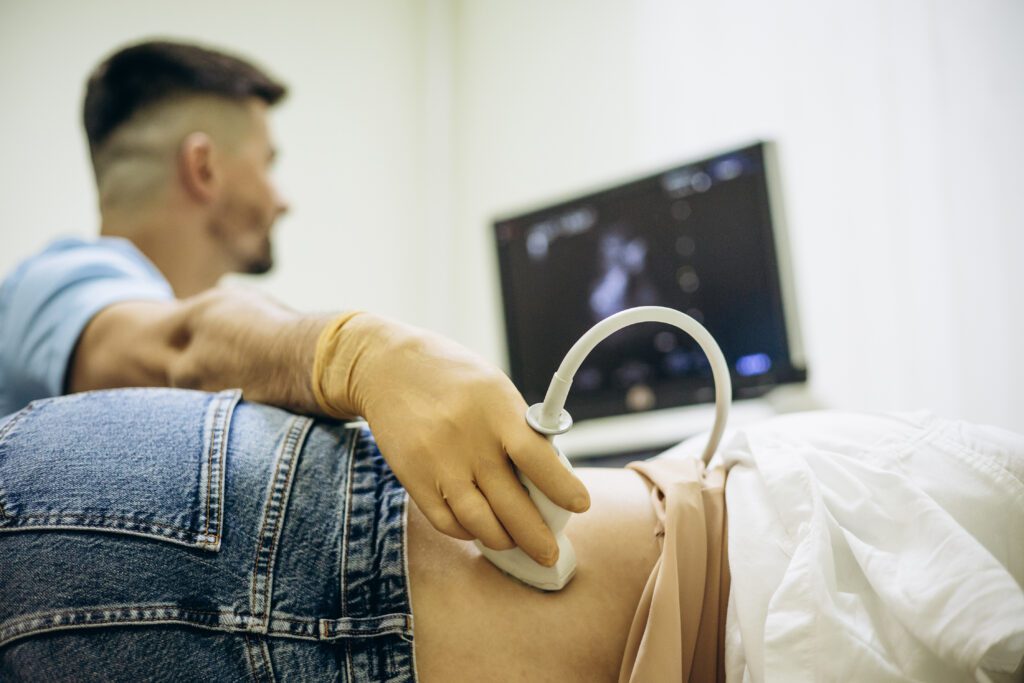When your doctor recommends that you get a kidney ultrasound, it means that they want a detailed look at your kidneys, so they can evaluate their function and overall health.
A kidney ultrasound (sometimes called a renal ultrasound) is a safe, painless, and non-invasive scan that takes detailed images of your abdomen, so that your healthcare doctor can understand the health and function of your kidneys.
This guide to kidney ultrasounds will go over:
- What a kidney ultrasound scan can show
- The kinds of abnormalities that show up on ultrasound result
- How ultrasounds check your kidney health
- How kidney ultrasound supports early detection and monitoring
What does a kidney ultrasound show?
A kidney ultrasound provides information about the health and function of your kidneys. The images it takes are sent to a computer screen so that they can be evaluated by a radiologist, which is a doctor trained to analyze imaging results, and by your personal healthcare provider.
This diagnostic tool helps identify potential kidney problems and allows doctors to rule out conditions like blockages, infections, or abnormalities. This helps them determine the next steps in care to address any health concerns centered around your kidney health.
How does a kidney ultrasound work?
A kidney ultrasound is a diagnostic scan that works by using sound waves to provide information about your kidneys. It uses a wand called a transducer that moves over the outside of your skin to gather information.
The size, shape, and location of your kidneys are measured by the sound waves, and your results are then displayed on a screen for your radiologist to study.
Why is an ultrasound often the first scan ordered for kidney concerns?
An ultrasound is often the first imaging test ordered for kidney concerns because it is safe, non-invasive, and provides a clear picture of the kidneys without using radiation.
It helps doctors assess the size, shape, and structure of the kidneys, identify any blockages or stones, and detect abnormalities like cysts or tumors.
Ultrasounds are also widely available and relatively quick, making them an efficient first step in diagnosing potential kidney issues.
What should I expect during a kidney ultrasound?
During a kidney ultrasound you will be asked to lie down on a table. The technologist who is doing the scan will put a gel on your abdomen.
This helps the transducer make a good connection with the skin by avoiding air gaps that could get in the way of clear imaging. The gel is water-soluble and does not stain.
The technologist will carefully move the wand of the transducer on your abdomen, and will gently press down, which helps them to obtain clear imaging results.
After the scan, your technologist will remove the ultrasound gel, and you’ll likely be able to continue with your daily activities as normal.
What abnormalities can a kidney ultrasound detect?
One of the benefits of a kidney ultrasound is that the images it provides can identify a range of conditions that can affect the kidneys. An ultrasound can show if there is fluid collecting around the kidneys, or if there are kidney stones, cysts, or tumors that may be present. It will also show whether the kidneys are enlarged, if they have shrunken in size.
What structural issues, like cysts or tumors, can a kidney ultrasound detect?
A kidney ultrasound can detect cysts, which are fluid-filled sacs that may form on or within the kidneys, and tumors, which could be benign (or non-cancerous) or malignant (cancerous) growths.
It can also identify other abnormalities such as scarring, blockages, or unusual changes in kidney size or shape. An ultrasound helps your doctor to diagnose these issues early, and to decide if further testing or treatment is needed.
How does an ultrasound find the signs of swelling or damage to the kidneys?
Kidney swelling often caused by infections or blockages appears on ultrasounds as enlarged or inflamed tissue, helping doctors pinpoint the root cause. A kidney ultrasound can also show abnormal fluid buildup or irregularities in the kidney’s structure, which may indicate damage.
How can a kidney ultrasound help diagnose a congenital condition?
A kidney ultrasound can help diagnose congenital conditions, which are problems with the kidneys present from birth, by providing clear images of their size, shape, and structure.
It can reveal issues like an abnormally shaped kidney, an extra kidney, a missing kidney, or conditions such as polycystic kidney disease, where cysts develop on the kidneys.
A kidney ultrasound helps your doctor to identify and monitor these conditions without invasive procedures. Early diagnosis is very important, as it helps guide treatment and management, to prevent complications later in life.

How kidney ultrasounds evaluate kidney health
If you experience back pain, discolored urine, or other recurrent urinary issues, your doctor may order a kidney ultrasound, which helps them to accurately diagnose the source of your condition.
Understanding your kidney health will help your provider to diagnose your condition, and to create a personalized treatment plan, which your doctor will create using your ultrasound results.
How can an ultrasound help to diagnose persistent pain in the lower back or abdomen?
A kidney ultrasound provides detailed imagery that can assist your healthcare doctor in understanding the source of lower back or abdominal pain.
The kidneys are located just under the ribcage, near the middle of the back on either side of the spine. Persistent pain in this location can suggest issues with kidney function, such as blockage or swelling.
A kidney ultrasound provides the information your doctor needs to understand more about whether the kidneys may be contributing to lower back or abdominal pain.
How does a kidney ultrasound help evaluate changes in urine, like discoloration?
A kidney ultrasound can help evaluate changes in urine, like discoloration, by identifying underlying kidney issues that may affect urine production or composition.
Ultrasounds can detect blockages, kidney stones, or swelling that may cause your urine to have a red or brown coloration.
Also, your ultrasound results can also reveal structural abnormalities or any signs of infection that could change your urine’s color or clarity.
What can the ultrasound reveal about kidney stones or blockages in my urinary tract?
A kidney ultrasound can reveal the size, shape, and location of kidney stones. Kidney stones may form a blockage in the urinary tract, and an ultrasound can detect the severity of the blockage, as well as whether a blockage is obstructing your urine flow.
How will my doctor use a kidney ultrasound to diagnose recurrent urinary issues?
If you have recurrent urinary issues, your doctor may use a kidney ultrasound to check for problems in your kidneys or urinary tract that could be causing these symptoms.
An ultrasound can detect blockages, such as kidney stones, or abnormalities like swelling, scarring, or structural irregularities that may contribute to frequent infections, or difficulty passing urine.
Why early detection with kidney ultrasounds matters
Kidney damage can occur before any symptoms are present, so early detection and regular monitoring are key in slowing or stopping progression of kidney disease. Your doctor can create a more effective treatment plan when your kidney issues are detected early.
How can early detection of kidney issues prevent long-term complications?
Long-term complications of kidney issues include serious health concerns that may require dialysis, should the kidneys no longer be able to filter waste from the body, otherwise known as kidney failure.
Early detection of kidney issues enables timely medical interventions and lifestyle adjustments, preventing complications like chronic kidney disease or kidney failure.
How does a kidney ultrasound help my doctor to plan further testing?
The results of a kidney ultrasound will include images that indicate whether the kidneys have growths, cysts, or tumors present, as well as evidence of kidney stones, swelling due to infection, or abnormal structural qualities.
Once your results are complete, your doctor may request additional tests or scans to determine the severity of a kidney condition, and to gather more information to create a more accurate treatment plan for you.
How will my doctor use ultrasounds to track my kidney health over time?
Your doctor can use kidney ultrasounds to monitor your kidney health over time by comparing images from previous scans to check for any changes.
Over time, regular ultrasounds can show if your kidneys are growing larger or smaller, if cysts or other abnormalities are developing, or if existing conditions like blockages or scarring are worsening.
Routine kidney ultrasounds monitor the progression of chronic conditions, evaluate treatment effectiveness, and guide necessary adjustments to protect your kidney health over time.
Schedule Your Kidney Ultrasound Today at Touchstone Imaging
Touchstone Medical Imaging provides comprehensive ultrasounds in Arkansas, Colorado, Florida, Montana, Oklahoma, and Texas.
Reach out to us at Touchstone, and we’ll help you schedule an appointment at an imaging center near you, today.
We’re here to help you get the answers you need.


Frequently Asked Questions (FAQ)
A: A kidney ultrasound uses sound waves to create images of your kidneys, helping healthcare providers assess their structure and function.
A: Ultrasounds are non-invasive, do not involve radiation, and provide detailed insights quickly, making them an ideal first step for kidney evaluation.
A: A kidney ultrasound can identify abnormalities like cysts, tumors, or other structural issues in the kidneys.
A: By showing changes in size, shape, or texture, an ultrasound can detect swelling or signs of injury to your kidneys.
A: It can show stones or blockages by highlighting disruptions in the urinary tract’s flow, or the presence of abnormal formations.
A: The scan can identify problems such as obstructions or abnormalities in the urinary tract, aiding in the diagnosis of repeated infections or other recurring issues.
A: Early detection allows for prompt treatment, potentially stopping kidney problems from worsening or leading to chronic conditions.
A: Doctor’s use regular ultrasounds to monitor changes in the kidneys, helping them adjust your treatment plan, as needed.

